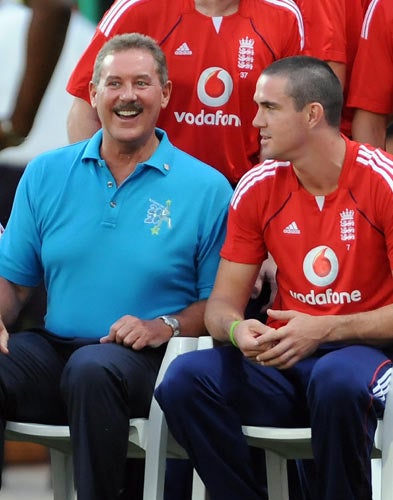Mark Nicholas: Clarke must pay the price for poor decision making

Your support helps us to tell the story
From reproductive rights to climate change to Big Tech, The Independent is on the ground when the story is developing. Whether it's investigating the financials of Elon Musk's pro-Trump PAC or producing our latest documentary, 'The A Word', which shines a light on the American women fighting for reproductive rights, we know how important it is to parse out the facts from the messaging.
At such a critical moment in US history, we need reporters on the ground. Your donation allows us to keep sending journalists to speak to both sides of the story.
The Independent is trusted by Americans across the entire political spectrum. And unlike many other quality news outlets, we choose not to lock Americans out of our reporting and analysis with paywalls. We believe quality journalism should be available to everyone, paid for by those who can afford it.
Your support makes all the difference.It now appears we should not have been so surprised by the news that Allen Stanford is under investigation by US authorities. The warning signs appear to have been there from before the England and Wales Cricket Board leapt into bed with him. It was, and for ever will be, a one-night stand of appalling taste and judgement.
The call for Giles Clarke’s head is fair enough, for it is he who has presided over an ugly and ill- conceived period of cricket administration – if you thought they had a laugh from Mumbai to Melbourne about the Pietersen/Moores fiasco, you should hear the howls of derision at the Stanford revelations.
But there is a more serious issue here than the right and wrong of the Stanford deal and its moral implication. After all, plenty of sports are supported by the banking world, where financial affairs have hardly been above board.
Much the most alarming point to come out of it all is that the quality and direction of the chairman’s decision making has been horrifyingly exposed. It is not even so much the current collapse of Stanford and his affairs; more that he was glorified by a board desperate to offset the embarrassment of irretrievable and expensive breakdowns first with India and then with South Africa and Australia.
These cost English cricket its share of the billion-dollar television deal for the Champions Twenty20 League – another IPL spin-off.
Clarke instead turned to the Caribbean and the Texan who could not convince anyone else to play with, or for, his money. Political expediency was leaked as a reason for the sudden tie up with West Indies cricket – votes count at the altar of the ICC – but the truth is that the chairman needed to appease restless England players, who were salivating at the riches available in the IPL and, even more urgently, he needed a trophy.
This is what he appears to be, a trophy hunter for his time at the helm of the English game and a financial one at that. With each tranche of money allocated to the counties, he has been able to act as their saviour and those without a viable or sustainable business model of their own have fallen at his feet.
But he does not appear to have given the game at large the pastoral care it needs. How could the Pietersen/ Moores situation have been allowed to develop in the first place, never mind become so public? Why were the imaginative group of board constituents who drafted a model for an original and potentially lucrative English Premier League, not allowed a hearing? Who has built the Chance to Shine smokescreen, pedalling the notion that money from the Stanford deal would find the pockets of the charity that is bringing cricket back into state schools and which the ECB so loves to talk about as if it was its own.
Three other excellent potential candidates – Sir Christopher Gent, Nigel Wray and Anthony Wreford – were approached to stand against Clarke but had neither the time nor the inclination to sell themselves for a song. In this case, the consequences of amateur rule are plain to see. Cleverly, Clarke has created the position of a full-time, unpaid though, in effect, executive chairman. It is a job few people of substance are prepared to undertake and those who are, such as the ballsy Lord Marland, find themselves hamstrung by the system of election. Five counties refused to meet Marland.
A last-minute beauty parade is unsatisfactory and unfair. There needs to be a transparent election process that allows candidates a specific period on the campaign trail, rather as if the counties were constituencies. Either that or the board must become a tighter and more relevant body that elects from within. This is the case in Australia, where the board of Cricket Australia comprises businessmen, administrators and eminent former players without vested interest in their own states.
Clarke may not yet have been torn apart but it’s not looking good. Michael Atherton said that the chairman must be judged by the consequences of his actions and many of these are already damaging. If his election is ratified for a further term, the game must expect more of the same.
So it is that English cricket chooses to appoint its leaders and conduct its affairs. It is a system established in the days of the horse and cart. There is a global financial crisis hammering far more robust structures than county cricket. Moral bankruptcy is one thing, the financial version would be quite another. He still has the television deal with Sky to fall back on but not much else. That deal was easy – he told us so himself. The world post-Stanford may be rather less generous.
Mark Nicholas captained Hampshire and now commentates on cricket in England and Australia
Join our commenting forum
Join thought-provoking conversations, follow other Independent readers and see their replies
Comments